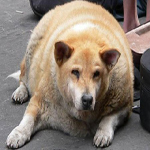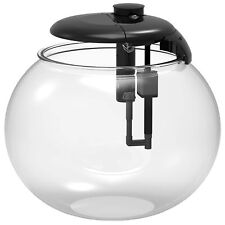Ice Water Causes Bloat: Fact or Fiction?
Over the last week, a blog article about canine bloat and ice has hit social media and has many dog owners concerned. With summer in full-swing and temperatures soaring, many dog lovers may needlessly heed the article’s warning that ice causes bloat. In order to ‘debunk’ this now viral internet myth, let’s take a look at canine bloat in more detail.
What is ‘bloat’?
Bloat, also known as gastric dilatation and volvulus (GDV), occurs when the stomach expands (dilatation) several times its normal size. Excessive gas and/or ingested material can cause this stretching. What makes bloat so dangerous is that often the stomach, blown up like a balloon, will rotate on itself (volvulus), causing a painful blockage to its blood flow. Without proper blood flow, the stomach tissues begin to die. This ‘twist’ also prevents gas and other materials from leaving the stomach. This life-threatening event must be corrected quickly or the dog may die within a few short hours.
Often the exact cause of a bloat is unknown but there are many predisposing factors. A few include excessive swallowing of air, intestinal obstruction, stomach motility problems, and eating a large meal followed by exercise. Some breeds are more predisposed to bloat due to their unique anatomy and ‘deep chests’, such as Great Danes, St. Bernards and Irish Setters. However, every pet owner needs to be aware of the problem and risks, as any breed of dog can bloat.
What does ice have to do with it?
Simply eating an occasional ice cube or drinking ice water in moderate amounts does not cause bloat. However, dogs ingesting a large amount of any temperature water all at once very quickly can predispose bloat. If the stomach rapidly fills with water, it often will fill with swallowed air as well, which is a dangerous scenario. Veterinarians don’t recommend feeding ice to dogs, as they can easily break their teeth when biting down on it.
When asked about the topic, Dr. David Dycus, a board-certified veterinary surgeon in Chattanooga, TN responded, “Interestingly, this (internet myth) has been circulating around since 2007…there is no published data in a veterinary journal with a large impact factor that shows that giving dogs ice or ice water causes muscles to cramp. Furthermore, there is no evidence that giving a dog ice water will cause it to bloat.”
Dogs that become overheated and overly thirsty are more prone to drinking water too quickly. Using ice alone to cool down an overheated dog can lead to other issues. If you think your dog is overheated, carefully take a rectal temperature, offer a small amount of cool or room-temperature water and call your veterinarian for further guidance.
How can I prevent bloat?
Bloat can be prevented by minimizing your dog’s risks, but no prevention method is 100%. Here are some tips for preventing bloat:
- Gastropexy
For at-risk large and giant breeds, many veterinarians recommend a prophylactic surgery called a gastropexy, which surgically ‘tacks’ the stomach to the body wall. This helps to prevent the dangerous rotation that happens after the stomach enlarges. This surgery is easily completed at the time of spay or neuter in puppies around 6 months of age.
- Eat and Relax
Don’t exercise your dog immediately after a meal. Allow your dog to relax and digest his or her food and save the daily jog for several hours later in the cool evening.
- Feed your dog more than one meal a day from an elevated bowl
An empty stomach is more likely to fill with gas and rotate, so feed your dog 2-3 small meals each day. Using an elevated bowl will help prevent your dog from swallowing excessive amounts of air. Always allow your dog access to water at all times in between and during meal times.
- Don’t allow your dog to consume excess amounts of water or food all at once
If you have spent all day at the beach and your dog has been without water for several hours, allow him or her small amounts of cool water frequently over the course of an hour. Don’t let him or her drink excessive amounts as this does predispose rapid filling, swallowing air and stretching of the stomach.
I think my dog is bloated, what do I do?
The signs of bloat can vary widely and some owners find their dog collapsed with no previous signs. Some owners notice that their pet’s abdomen appears more full than normal, but this is not a reliable sign. The most important signs include salivation, nausea, vomiting, and retching but nothing comes up. If you see any of these signs, your dog requires immediate veterinary care.
Following simple prevention tips and keeping an eye on your dog this summer will help keep bloat at bay. Remember to keep your canine friend indoors during the hottest parts of the day and never restrict access to water. Don’t ever leave your dog in the car unattended. Cooling water with ice cubes can encourage dogs to drink on a hot day. Just remember to keep everything in moderation and enjoy these ‘dog days of summer.’
Resources
Brooks, Wendy. Bloat, The Mother of All Emergencies. Veterinary Partner. 01/06/2012.














